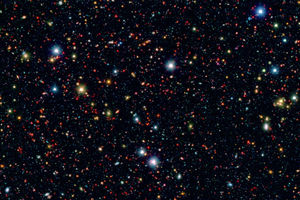
In any area of research, and particularly one which already boasts centuries of advances and impressive claims of conquest, new discoveries and even significant paradigm shifts (to use the catchphrase) normally involve readjustments, novel perspectives, or newly-added pieces to an already increasingly coherent jigsaw puzzle. Newton’s theory of gravitation, Maxwell’s unveiling of the electromagnetic spectrum, and even Einstein’s relativity and Planck’s quantum theory, for all their dramatic novelty, still looked at and interpreted the cosmos we live in and seemed to make it more intelligible, even if a bit stranger.
Something, however, has become increasingly evident in contemporary astronomy and physics which overshadows all of the famed “revolutions” of the past. We are told by prestigious scientists – with furrowed brow and noble effort to maintain the air of august authority we have bestowed upon them – that it appears that everything they have so painstakingly taught us about molecules and atoms and quarks and quasars and galaxies – in a word, about the material universe – applies only to less than 5% [sic] of the whole of physical reality. The rest of the real (95% of it, that is) is ominously termed “dark” (about 25% being “dark matter,” and some 70%, “dark energy”). I heard a leading physicist recently asked by a layman why they call it dark, and, with refreshing honesty, he replied: “Because we don’t know what it is.”
Since my expertise lies in the areas of philosophy and theology, I usually keep my mouth buttoned about the natural sciences, only commenting on what seems to be the current consensus on scientific issues which border on my topics of study. However, when I learned that the 95% thesis is indeed now scientific consensus, both my philosophical and theological antennae shot into full length like bolts of lightning. Huh?
I am not doubting for a moment what they say, but this confirms even more what I have always felt, namely, that scientists are rarely conscious of the wider implications of their discoveries. This one has implications that must have the aforementioned past masters not just turning in their graves, but twirling. Imagine any other major area of study and what would happen if its specialists suddenly discovered, after decades of research and confident proclamations, that they had somehow overlooked 95% of their subject matter?
To be fair, some scientists are already presaging a major reshaping of physical science for the rest of the 21st century. And I wish them well. But what I wish them more than anything else is a nice, big slice of humble pie. Nothing has been used more as a weapon against religion and metaphysics in recent centuries, and most particularly in the last, than science.
Good and proven science, in my view, has never been a threat to good religion or good metaphysics, but the pretense of “scientism” – namely, the belief that the only reliable form of human knowledge is that delivered by modern science – has long needed a good kick somewhere below the belt. How opportune that the very precision instruments of the scientists have forced them to acknowledge the fragmentary nature of much of their grandstanding claims about physical reality. Let us invite old Carl Sagan back from the grave to rephrase his tiresome mantra about bigness and quantity. He was an honest man, so I can imagine him now procaliming: “There are b-b-b-billions of things we don’t know about the cosmos!”



